- Home
- Mario Puzo
Fools die Page 7
Fools die Read online
Page 7
I shrugged, smiled and went on with my story.
Chapter 5
I have no history. No remembered parents. I have no uncles, no cousins, no city or town. I have only one brother, two years older than me. At the age of three, when my brother, Artie, was five, we were both left in an orphanage outside New York. We were left by my mother. I have no memory of her.
I didn’t tell this to Cully and Jordan and Diane. I never talked about those things. Not even to my brother, Artie, who is closer to me than anyone in the world.
I never talk about it because it sounds so pathetic, and it wasn’t really. The orphanage was fine, a pleasant, orderly place with a good school system and an intelligent administrator. It did well by me until Artie and I left it together. He was eighteen and found a job and an apartment. I ran away to join him. After a few months I left him too, lied about my age and joined the Army to fight in WW II. And now here in Vegas sixteen years later I told Jordan and Cully and Diane about the war and my life that followed.
The first thing I did after the war was to enroll in writing courses in the New School for Social Research. Everybody then wanted to be a writer, as twenty years later everyone hoped to be a film-maker.
I had found it hard to make friends in the Army. It was easier at the school. I also met my future wife there. Because I had no family, except for my older brother, I spent a lot of time at the school, hanging out in the cafeteria rather than going back to my lonely rooms in Grove Street. It was fun. Every once in a while I got lucky and talked a girl into living with me for a few weeks. The guys I made friends with, all out of the Army and going to school under the GI Bill, talked my language. The trouble was that they were all interested in the literary life and I was not. I just wanted to be a writer because I was always dreaming stories. Fantastic adventures that isolated me from the world.
I discovered that I read more than anyone else, even the guys going for PhD’s in English. I didn’t really have much else to do, though I always gambled. I found a bookie on the East Side near Tenth Street and bet every day on ball games, football, basketball and baseball. I wrote some short stories and started a novel about the war. I met my wife in one of the short-story classes.
She was a tiny Irish-Scotch girl with a big bust and large blue eyes and very very serious about everything. She criticized other people’s stories carefully, politely, but very toughly. She hadn’t had a chance to judge me because I had not yet submitted a story to the class. She read a story of her own. And I was surprised because the story was very good and very funny. It was about her Irish uncles who were all drunks.
So when the story was over, the whole class jumped on her for supporting the stereotype that the Irish drank. Her pretty face contorted in hurt astonishment. Finally she was given a chance to answer.
She had a beautiful soft voice, and plaintively she said, “But I’ve grown up with the Irish. All of them drink. Isn’t that true?” She said this to the teacher, who also happened to be Irish. His name was Maloney and he was a good friend of mine. Though he didn’t show it, he was drunk at that very moment.
Maloney leaned back in his chair and said solemnly, “I wouldn’t know, I’m Scandinavian myself.” We all laughed and poor Valerie bowed her head, still confused. I defended her because though it was a good story, I knew she would never be a real writer. Everybody in the class was talented, but only a few had the energy and desire to go a long way, to give up their life for writing. I was one of them. I felt she was not. The secret was simple. Writing was the only thing I wanted to do.
Near the term end I finally submitted a story. Everybody loved it. After class Valerie came up to me and said, “How come I’m so serious and everything I write comes out sounding so funny? And you always make jokes and act as if you’re not serious and your story makes me cry?”
She was serious. As usual. She wasn’t coming on. So I took her for coffee. Her name was Valerie O’Grady, a name she hated for its Irishness. Sometimes I think she married me just to get rid of the O’Grady. And she made me call her Value. I was surprised when it took me over two weeks to get her in bed. She was no free swinging Village girl and she wanted to be sure I knew it. We had to go through a whole charade of my getting her drunk first so that she could accuse me of taking advantage of a national or racial weakness. But in bed she surprised me.
I hadn’t been that crazy about her before. But in bed she was great. I would guess that there are some people who fit sexually, who respond to each other on a primary sexual level. With us I think we were both so shy, so withdrawn into ourselves, that we couldn’t relax with other partners sexually. And that we responded to each other fully for some mysterious reason springing out of that mutual shyness. Anyway, after that first night in bed we were inseparable. We went to all the little movie houses in the Village and saw all the foreign films. We’d eat Italian or Chinese and go back to my room and make love, and about midnight I’d walk her to the subway so that she could go home to her family in Queens. She still didn’t have the nerve to stay overnight. Until one weekend she couldn’t resist. She wanted to be there Sunday to make me breakfast and read the Sunday papers with me in the morning. So she told the usual daughterly lies to her parents and stayed over. It was a beautiful weekend. But when she got home she ran into a clan fire fight. Her family jumped all over her, and when I saw her Monday night, she was in tears.
“Hell,” I said. “Let’s get married.”
She said in surprise, “I’m not pregnant.” And was even more surprised when I burst out laughing. She really had no sense of humor, except when she wrote.
Finally I convinced her that I meant it. That I really wanted to marry her, and she blushed and then started to cry.
So on the following weekend I went out to her family’s house in Queens for Sunday dinner. It was a big family, father, mother, three brothers and the three sisters, all younger than Value. Her father was an old Tammany Hall worker and earned his living with some political job. There were some uncles there and they all got drunk. But in a cheerful happy-go-lucky way. They got drunk as other people stuff themselves at a big dinner. It was no more offensive than that. Though I didn’t usually drink, I had a few and we all had a good time.
The mother had dancing brown eyes. Value obviously got her sexuality from the mother and lack of humor from her father. I could see the father and uncles watching me with shrewd drunken eyes, trying to judge whether I was just a sharpie screwing their beloved Value, kidding her about marriage.
Mr. O’Grady finally got to the point. “When are you two planning to get hitched?” he asked. I knew if I gave the wrong answer, I could get punched in the mouth by a father and three uncles right then and there. I could see the father hated me for screwing his little girl before marrying her. But I understood him. That was easy. Also, I wasn’t hustling. I never hustled people, or so I thought. So I laughed a rid said, “Tomorrow morning.”
I laughed because I knew it was an answer that would reassure them but one they could not accept. They could not accept because all their friends would think that Value was pregnant. We finally settled on a date two months ahead, so that there would be formal announcements and a real family wedding. And that was OK with me too. I don’t know whether I was in love. I was happy and that was enough. I was no longer alone, I could begin my true history. My life would extend outward, I would have a family, wife, children, my wife’s family would be my family. I would settle in a portion of the city that would be mine. I would no longer be a single solitary unit. Holidays and birthdays could be celebrated. In short, I would be “normal” for the first time in my life. The Army really didn’t count. And for the next ten years I worked at building myself into the world.
The only people I knew to invite to the wedding were my brother, Artie, and some guys from the New School. But there was a problem. I had to explain to Vallie that my real name wasn’t Merlyn. Or rather that my original name was not Merlyn. After the war I changed my name legally. I ha
d to explain to the judge that I was a writer and that Merlyn was the name I wanted to write under. I gave him Mark Twain as an example. The judge nodded as if he knew a hundred writers who had done the same thing.
The truth was that at that time I felt mystical about writing. I wanted it to be pure, untainted. I was afraid of being inhibited if anybody knew anything about me and who I really was. I wanted to write universal characters. (My first book was heavily symbolic.) I wanted to be two absolutely separate identities.
It was through Mr. O’Grady’s political connections that I got my job as federal Civil Service employee. I became a GS-6 clerk administrator to Army Reserve Units.
After the kids, married life was dull but still happy. Value and I never went out. On holidays we’d have dinner with her family or at my brother Artie’s house. When I worked nights, she and her friends in the apartment house would visit each other. She made a lot of friends. On weekend nights she’d visit their apartments when they had a little party and I’d stay in our apartment to watch the kids and work on my book. I’d never go. When it was her turn to entertain, I hated it, and I guess I didn’t hide that too well. And Vallie resented it. I remember one time I went into the bedroom to look at the kids and I stayed in there reading some pages of manuscript. Vallie left our guests and came looking for me. I’ll never forget the hurt look when she found me reading, so obviously reluctant to come back to her and her friends.
It was after one of these little affairs that I got sick for the first time. I woke up at two in the morning and felt an agonizing pain in my stomach and all over my back.
I couldn’t afford a doctor so the next day I went to the Veterans Administration hospital, and then they took all kinds of X-rays and made some other tests over a period of a week. They couldn’t find anything, but I had another attack and just from the symptoms they diagnosed a diseased gall bladder.
A week later I was back in the hospital with another attack, and they shot me full of morphine. I had to miss two days’ work. Then about a week before Christmas, just as I was about to finish up work on my night job, I got a hell of an attack. (I didn’t mention that I was working nights in a bank to get extra money for Christmas.) The pain was excruciating. But I figured I could make it to the VA hospital on Twenty-third Street. I took a cab that let me off about a half block from the entrance. It was now after midnight. When the cab pulled away, the pain hit me an agonizing solar plexus blow. I fell to my knees in the dark street. The pain radiated all over my back. I flattened out onto the ice-cold pavement. There wasn’t a soul around, no one that could help me. The entrance to the hospital was a hundred feet away. I was so paralyzed by pain I couldn’t move. I wasn’t even scared. In fact, I was wishing I would just die, so that the pain would go away. I didn’t give a shit for my wife or my kids or my brother. I just wanted out. I thought for a moment about the legendary Merlin. Well, I was no fucking magician. I remember rolling over once to stop the pain and rolling off the ledge of the sidewalk and into the gutter. The edge of the curb was a pillow for my head.
And now I could see the Christmas lights decorating a nearby store. The pain receded a little. I lay there thinking I was a fucking animal. Here I was an artist, a book published and one critic had called me a genius, one of the hopes of American literature, and I was dying like a dog in the gutter. And through no fault of my own. Just because I had no money in the bank. Just because I had nobody who really gave a shit about whether I lived or not. That was the truth of the whole business. The self-pity was nearly as good as morphine.
I don’t know how long it took me to crawl out of the gutter. I don’t know how long it took me to crawl through to the entrance of the hospital, but I was finally in an arc of light. I remember people putting me in a wheelchair and taking me to the emergency room and I answered questions and then magically I was in a warm white bed and feeling blissfully sleepy, without pain, and I knew they had shot me with morphine.
When I awoke, a young doctor was taking my pulse. He had treated me the other time and I knew his name was Cohn. He grinned at me and said, “They called your wife, she’ll be down to see you when the kids go to school.”
I nodded and said, “I guess I can’t wait until Christmas for that operation.”
Dr. Cohn looked a little thoughtful and then said cheerily, “Well, you’ve come this far, why don’t you wait until Christmas? I’ll schedule it for the twenty-seventh. You can come Christmas night and we’ll get you ready.”
“OK,” I said. I trusted him. He had talked the hospital into treating me as an outpatient. He was the only guy who seemed to understand when I said that I didn’t want the operation until after Christmas. I remember his saying, “I don’t know what you’re trying to do, but Fm with you.” I couldn’t explain that I had to keep working two jobs until Christmas so my kids would get toys and still believe in Santa Claus. That I was totally responsible for my family and its happiness, and it was the only thing I had.
I’ll always remember that young doctor. He looked like your movie actor doctor except that he was so unpretentious and easy. He sent me home loaded up with morphine. But he had his reasons. A few days after the operation he told me, and I could see how happy it made him to tell me, “Listen, you’re a young guy to have gallbladder and the tests didn’t show anything. We went on your symptoms. But that’s all it was, gallbladder, big stones. But I want you to know there was nothing else in there. I took a real good look. When you go home, don’t worry. You’ll be as good as new.”
At that time I didn’t know what the hell he meant. In my usual style it only came to me a year later that he had been afraid of finding cancer. And that’s why he hadn’t wanted to operate before Christmas with just a week to go.
Chapter 6
I told Jordan and Cully and Diane how my brother, Artie, and my wife, Vallie, came to see me every day. And how Artie would shave me and drive Vallie back and forth from the hospital while Artie’s wife took care of my kids. I saw Cully smiling slyly.
“OK,” I said. “That scar I showed you was my gallbladder scar. No machine guns. If you had any fucking brains you’d know I would never be alive if I got hit like that.”
Cully was still smiling. He said, “Did it ever cross your mind that when your brother and your wife left the hospital maybe they fucked before going home? Is that why you left her?”
I laughed like hell, and I knew I'd have to tell them about Artie.
“He’s a very good-looking guy,” I said. “We look alike, but he’s older.” The truth is that I’m a sort of charcoal sketch of my brother, Artie. My mouth is too thick. My eye sockets are too hollow. My nose is too big. And I look too strong, but you should see Artie. I told them that the reason I married Value was that she was the only one of my girlfriends who didn’t fall in love with my brother.
My brother, Artie, is incredibly handsome on a delicate scale. His eyes are like those eyes in the Greek statues. I remember when we both were bachelors how girls used to fall in love with him, cry over him, threaten to kill themselves over him. And how distressed he’d be about that. Because he really didn’t know what the hell it was all about. He could never see his beauty. He was a little self-conscious about being small, and his hands and feet were tiny. “Just like a baby’s,” one girl had said adoringly.
But what distressed Artie was the power he had over them. He finally came to hate it. Ah, how I would have loved it, girls never fell in love with me like that. How I would like it now, that sheer senseless falling in love with externals, the love never earned by qualities of goodness, of character, of intelligence, of wit, of charm, of life-force. In short, how I would like to be loved in a way never earned so that I would never have to keep earning ft or work for it. I love that love the way I love the money I win when I get lucky gambling.
But Artie took to wearing clothes that didn’t fit. He dressed conservatively in a way that didn’t suit his looks. He deliberately tried to hide his charm. He could only relax and be his nat
ural self with people he really cared about arid felt safe with. Otherwise he developed a colorless personality that in an inoffensive way kept everyone at a distance. But even so he kept running into trouble. So he married young and was maybe the only faithful husband in the city of New York.
On his job as a research chemist with the federal Food and Drug Administration his female associates and assistants fell in love with him. His wife’s best friend and her husband won his trust, and they had a great friendship for about five years. Artie let his guard down. He trusted them. He was his natural self. The wife’s best friend fell in love with him and broke up her marriage and announced her love to the world, causing a lot of trouble and suspicion from Artie’s wife. Which was the only time I ever saw him angry with her. And his anger was deadly. She accused him of encouraging the infatuation. He said to her in the coldest tone I ever heard any man use to a woman, “If you believe that, get the hell out of my life.” Which was so unnatural of him that his wife almost had a breakdown from remorse. I really think she hoped he was guilty so she could get a hold over him. Because she was completely in his power.
She knew something about him that I knew and very few other people knew. He could not bear to inflict pain. On anyone or anything. He could never reproach anyone. That’s why he hated women being in love with him. He was, I think, a sensual man, he would have loved a great many women easily and enjoyed it, but he could never have borne the conflicts. In fact, his wife said the one thing she missed in their relationship was that she could use a real fight or two. Not that she never had fights with Artie. They were married after all. But she said that all their fights were one-punch affairs, figuratively, of course. She’d fight and fight and fight, and then he’d wipe her out with one cold remark so devastating she would burst into tears and quit.

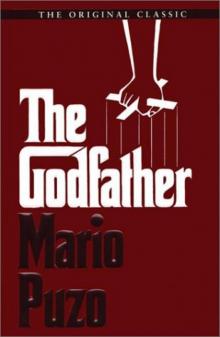 The Godfather
The Godfather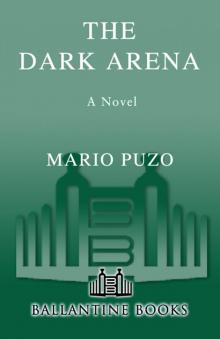 The Dark Arena
The Dark Arena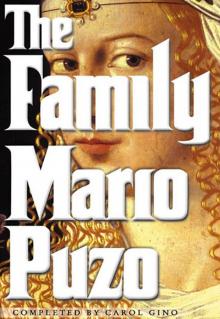 The Family
The Family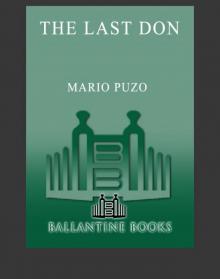 Last Don
Last Don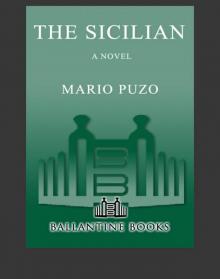 The Sicilian
The Sicilian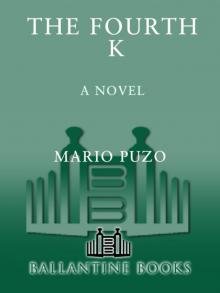 The Fourth K
The Fourth K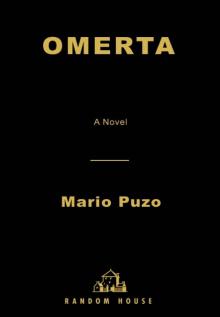 Omerta
Omerta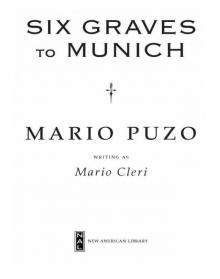 Six Graves to Munich
Six Graves to Munich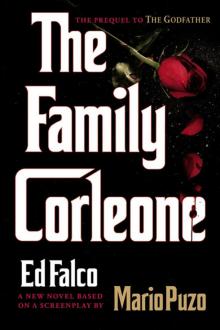 The Family Corleone
The Family Corleone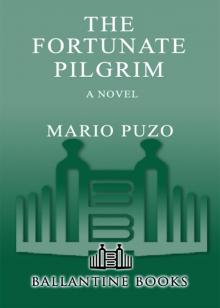 The Fortunate Pilgrim
The Fortunate Pilgrim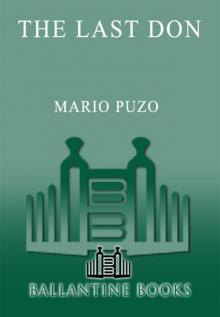 The Last Don
The Last Don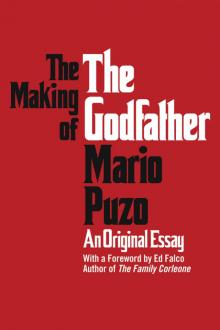 The Making of the Godfather
The Making of the Godfather Fools die
Fools die The Sicilian (v2.0)
The Sicilian (v2.0)